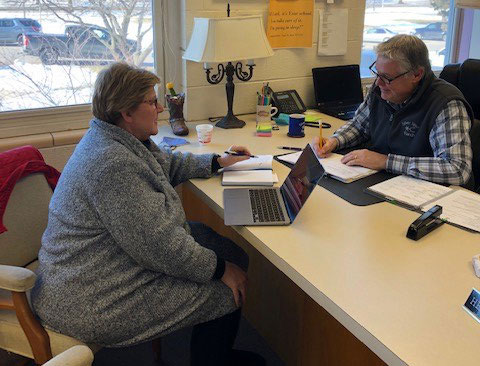
By Barb Arland-Fye
The Catholic Messenger
Six months into her new post, diocesan Superintendent of Schools Lynne Devaney is striving to foster a spirit of inquiry to make the Catholic faith “relevant to what our kids are experiencing.”
“Look at the history of our Church. We were out on the front line, responding to the needs of the times. Today, people are afraid of introducing inquiry into our classrooms, afraid of where it will take them.” Inquiry encourages, not stifles, curiosity and integrates faith into the lived experience of students and educators, Devaney said.
“If we can’t keep the content of our faith relevant to the students sitting in front of us that day, they will see that. When we start hiding the issues of the day, it creates a toxic culture. We have to enter into a spirit of inquiry. The Church teaches us about possibilities within the parameters of absolute truths,” she said. For example, the Church teaches that all life is sacred. “Within that truth we don’t have to be afraid to explore what it means for us to hold all life sacred.”
Having served in leadership positions in public and Catholic school systems in Iowa and Wisconsin, Devaney believes she brings a perspective that facilitates inquiry and growth in faith for students and their adult educators.
“We’ve been using the Emmaus story with the adults in our Catholic schools this year, building on the theme of evangelization introduced during Vision 20/20,” she said. The educators have been reflecting on the story of two disciples’ encounter with Jesus, how their hearts were burning within them after they recognized him in the breaking of the bread. “The Church has the ability to draw us into these layers of meaning of encounter with Christ, recognition of Christ and accompaniment of others on their journey toward Christ.”
A song that resonates with her, on this lifelong Emmaus journey is “Still We Sing Alleluia,” by Paulo K. Tirol. The song speaks to the struggles and triumphs in society, and how in the best and worst of times, Christians still sing Alleluia. “For we know the Lord has risen and conquered sin. In Him we know: that light, and life, and love shall win.”
“Even in our toughest hours, still we sing,” Devaney says. “I’m really struck by that.” The song’s message aligns with her commitment to the practice of faith, hope and charity, and making the effort to “find our shared spirituality.” Art, music, visual journeying, a single phrase from Scripture, all of these things foster faith and its relevance in the lived experiences of Catholics in and out of school, she believes.
As Devaney states in her Catholic Schools Week letter, “When we encounter others, we extend hospitality and welcome. When we recognize others, we empower every voice at the table to be heard. When we accompany others on their journey, we are present to others with our time, our talent and our listening.”
One of the things she appreciates most about returning to Catholic school administration is the liturgical calendar. For the secular world, Feb. 2 is just another day on the calendar. On the liturgical calendar, Feb. 2 celebrates the Presentation of the Lord. “The colors of the liturgical calendar imbue a mindset” of faith, Devaney said. During her visits to diocesan schools in December, she was heartened to see the Advent colors and not the red and green and Santa Claus images of the secular holiday.
Her commitment to “make sure we are challenging ourselves to do better, to take it to the next level,” is put to the test in an in-progress curriculum study on religion that she has been tasked with leading. “In working with the committee and with others, it became clear to me that this is going to be a much needed review for us,” Devaney said. The study addresses the six major domains of catechesis for grades PreK-12: knowledge of the faith, liturgical education, prayer, moral formation, community life, and teaching missions. By the fifth and sixth domains, students are expected to demonstrate their knowledge through action. While multiple choice and true and false questions have their place, “I’d like to see other ways to expand our thinking, what I would call ‘wider reading.’ It’s about stretching ourselves.”
Asked how Catholic school leaders assess her efforts at communication and collaboration, she said, “Maybe they’re not telling me everything, but what they have expressed to me is that they appreciate the opportunity to work together…. The road I am on is the road I will continue on.”
In her visits to schools, she has discovered that each one has a good sense of what makes that school unique. “Everyone loves their school,” she said. They also take pride in subsidiarity, the ability to make decisions locally. Conversely, “sometimes (school leaders) don’t know how to ask for help.”
What brings Devaney joy in her new position is witnessing people’s “big vision” of what the world should look like. They are the disciples on the road to Emmaus, breaking bread with Jesus and recognizing him, and their hearts are burning within because they need to share that good news. “Who could want better than that?”











